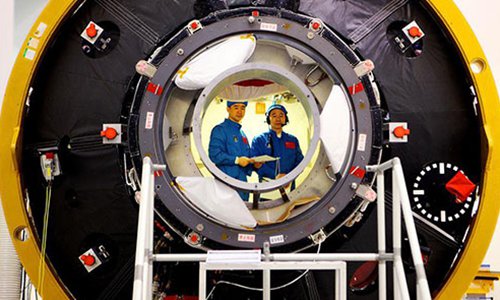
Taikonauts Jing Haipeng (R) and Chen Dong have a training in the space lab Tiangong-2 on Aug. 28, 2015. (Photo: Xinhua)
China's manned space program has taken another step forward after authorities revealed on Tuesday that the Tianhe, the core module of the country's upcoming space station, has completed testing, including a vacuum heat test and will soon advance to the flight modeling stage, a day before the country's fourth aerospace day.
China's new space station, codenamed Tiangong, is designed to be in service for 10 years, which could be extended through repair and renovation works according to specific needs. Its designed capacity is for three astronauts, and it can accommodate up to six for short periods during personnel rotation, providing a long-term orbiting space lab for China.
The Tiangong will consist of the core module Tianhe, the Wentian lab capsule I and the Mentian lab capsule II, each weighing 20 tons.
According to a video clip played at the event to mark aerospace day, the Wentian and Mengtian prototype capsules are now being assembled.
The video also shows that the Long March-5B carrier rocket will blast off on its maiden flight in the first half of the 2020.

An artist rendering of the completed Chinese Space Station, including docked Shenzhou and Tianzhou spacecraft. (Photo: China Manned Space)
Primary selection for the third group of astronauts is over, and the spacesuit for spacewalks is also in production, shows the video.
So far, China has sent 12 spaceships into space as well as two space labs, the Tiangong-1 and Tiangong 2.
China is scheduled to complete construction of the space station around 2022. In June, the China Manned Space Engineering Office will work with the United Nations Office for Outer Space Affairs to complete the application for China's space station and to launch a number of cooperation projects, the Xinhua News Agency reported in March.


